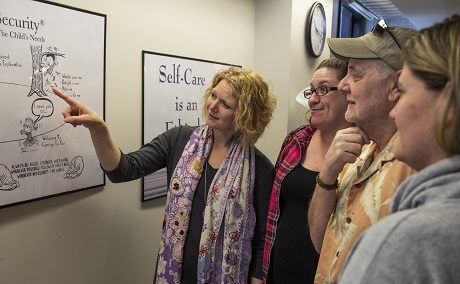Healing with Hearts and Minds
The Addiction Studies program at COCC combines clinical skills and personal development practices to best prepare tomorrow’s counselors
Piecing together a genogram can be a cathartic and eye-opening experience. It can
also be rather unsettling. The process involves assembling a family tree, several
generations deep, to map out relationship dynamics and connections through the ages,
identifying things like divorce, suicide and degrees of closeness among family members.
It serves to identify patterns, to help explore an individual’s journey — and the
realities they face.
For Joellen Billington, who recalls diving into this project as part of her Central
Oregon Community College (COCC) Addiction Studies education, the exercise at first disoriented her. And then she figured out why. “I
had not dealt with my own demons yet,” she recalled, having grown up in a family full
of addiction herself. “This project made me realize that I needed to work on myself,
and my demons, before I could help anyone else. It was a very powerful class.”
Billington is now helping plenty of others as she coordinates the Burns Paiute Tribe’s
alcohol and drug program, a resource she has helped launch and develop while also
working toward a bachelor’s degree in forensic psychology. “The most meaningful part
of my job is that I get to have a voice in state policies and procedures,” she said.
“I serve on the Nine Federal Tribes of Oregon board and the Oregon Health Authority
board for the Burns Paiute Tribe. This is all thanks to this program teaching me to
be confident in myself, accept the past, and heal and allow myself to move forward.”
The certificate, which incorporates 300 of the required 1,000 hours of on-the-job training for professional certification, readies graduates to sit for the state’s tier-1 Certified Alcohol Drug Counselor (CADC) exam. It’s a level that allows counselors to facilitate recovery groups. With an additional term of schooling, folding in further practicum experience, students can earn an Associate of Applied Science degree and take Oregon’s CADC-II exam, a credential that enables them to supervise others in the field.
The Associate of Arts Oregon Transfer degree, a general degree with a focus on Human Services, is also oriented toward CADC-II capability, but modeled with all the necessary coursework to continue with a bachelor’s degree or advanced studies.
Training students to counsel others in moving forward is the focus of COCC’s Addiction Studies and Human Services department. The small program combines lectures, a tight-knit atmosphere and immersions in clinical settings to yield one of three academic outcomes: a two-year certificate, an associate degree or a transfer degree.
“If students are unsure, I map out the pathways with them,” explained professor Monica
Vines, program director. To help with this, and aid students in evaluating where they
want to go with their profession, an early-on term paper involves interviewing someone
already working in the field. The assignment helps cast an eye on everything from
work demands and weekly schedule to job intensity and salary.
It also reinforces another facet of the training. “We require a lot of writing in
the program — to document clearly, to communicate clearly,” Vines added. “A lot of
the job is paperwork.”
Throughout, students find a supportive and pragmatic learning environment. They learn
required skills and strategies to help others, but also condition themselves on coping
with an emotionally demanding career. “I challenge them to look at areas where they
might struggle,” said Vines. “In a lot of classes, I focus on self-reflection. We
talk about self-care a lot.”
On a recent morning in the Bend campus’s Modoc building, that self-care theme continually
surfaces as students of an “Ethics in Human Services” class move through some thought-provoking
territory.
They grapple with issues that pertain to end-of-life decisions. And they reflect on
how value systems impact the patient-counselor relationship. Part of the discussion
is on the role of law versus ethics. It’s heady material. A poster on the wall declares,
sympathetically but insistently, “Self-care is an ethical mandate.”
“What’s another resource we’ve talked about?” Vines asked her students. “Personal
counseling,” answered a female student. Their professor nodded. “It’s such an important
component of this process,” she said, “to not practice in isolation,” stressing how
having a counselor of one’s own can lead to more effective work.
And the work itself is varied, with many doors open. In fact, the program often receives
calls from local agencies looking for help.
Some former students have fashioned their own doors. Larry Kogovsek, who attended
the program to train as a grief counselor, went on to spearhead two nonprofits that
currently serve Central Oregon: Sagewood Sanctuary, a low-barrier (without sober stipulations)
homeless shelter, and Cascade Peer and Self-Help Center, a drop-in service that provides
companionship and supports people afflicted with mental health challenges. “Monica
gave me the courage and the skills to lead these efforts,” shared Kogovsek. “She gave
me the heart and mind to pursue them.”
For more details, visit the Addiction Studies program at Central Oregon Community College or call 541-383-7700.
By Mark Russell Johnson, COCC College Relations

